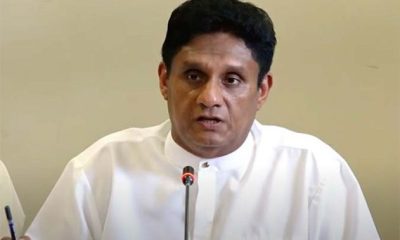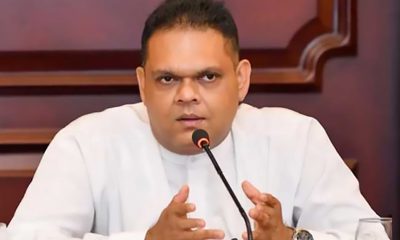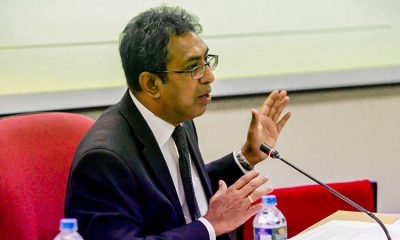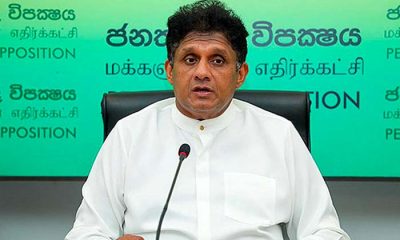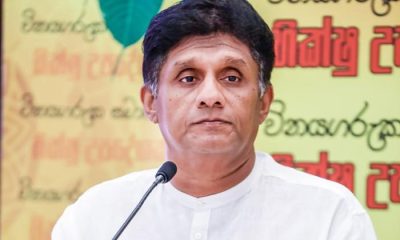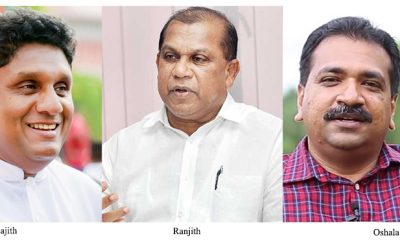Editorial
Schaffter and Diana

Last week saw determinations by the courts of two long-standing matters that had commanded widespread public interest. The first of these related to the death of Dinesh Schaffter, a leading businessman and the member of a well known business family in Colombo, on the night of December 15, 2022, while under intensive care at the Colombo National Hospital.
The other was the case on whether Diana Gamage, now the State Minister of Tourism, who entered parliament on the national list of the Opposition Samagi Jana Balavegaya (SJB) and subsequently defected to the government taking office as a state minister was entitled to remain a Member of Parliament. This had nothing to do with her defection, but was connected to whether or not she was entitled to sit and vote in parliament on account of her alleged British citizenship.
Schaffter was found last year near dead in his car parked inside the Borella general cemetery. He was trussed up and appeared to have been strangled. The first impression was that this was a high profile murder with no motive clearly established, although there were later reports of traces of cyanide discovered in his body that fueled suicide speculation.
After his remains were buried a few days after his death, it was exhumed some weeks later for further forensic examination by court order and further investigations carried out by an expert panel of five forensic scientists. This panel included university academics in forensic medicine, one serving judicial medical office (JMO) and another who had served in that capacity in Kandy. On the basis of the widely awaited report of this expert panel, Colombo’s additional magistrate held on the basis of the findings of four of the five-member panel that death was due to strangulation – “pressure applied to his neck and face” to use the language of the determination.
Although a death certificate has now been issued, the dissenting opinion within the five-member forensic panel was that this was a “complex suicide” committed by ingesting cyanide while trying to make the death look like murder. Undoubtedly, the way events in this case unfolded was heartbreaking for the late businessman’s family.
His father, Chandra Schaffter, a national cricketer of yesteryear and a guru to the country’s national insurance industry, wrote a heart wrenching letter some months ago appealing to the public for peace to permit the family to grieve. Having met his son hours before he died, Schaffter Snr. wrote “Based on my interaction with him that day, I am certain that Dinesh was not anticipating any danger. So, what followed was a complete shock to all of us. I know he did not have an inkling of the dastardly plot that resulted in his death.”
The magistrate has rightly ordered the police to arrest a suspect/suspects and produce him/them in court. But the way the narrative has been unfolding, there seems to be little hope of that being possible, at least in the short term, unless a dramatic breakthrough materializes. Ordinary people, especially those who read Schaffter Snr.’s latter, would have nothing but sympathy for the businessman’s family.
Quite apart from what his father had to say about him, he appears to have been a most lovable personality. But as we have reported in our news story today, criminal investigators have begun looking for a motive and suspects. How far such investigations would go and whether a conclusive determination will ever be reached will remain an open question.
As far as the Diana Gamage case is concerned, no final determination has yet been made as the present status is that the majority verdict of the three-judge appeal court bench can be can be canvassed before the supreme court. The appellant is already on record saying he will be going before the supreme court.
There has been no detailed reporting of the majority judgment of the President of the Appeal Court, Mr. Nissanka Bandula Karunaratne (with Mr. KKV Swarnadhipathi agreeing) and the dissenting judgment of Mr. MAR Marikar. But these have been published and will no doubt be subject of keen debate and discussion in legal circles. Readers may remember that on an earlier occasion when the case was heard by two judges, Judges Karunaratne and Marikar, the determination was divided and it had to go before a three-judge bench. An application for a five-judge bench was not allowed.
Diana Gamage is, of course, a politician very much in the news not only for her looks. She was accommodated on the SJB national list, for the reasons that Opposition Leader Sajith Premadasa, when he broke away from Ranil Wickremesinghe and the UNP, did not have a party of his own to field at the parliamentary election of August 2020. He did what has been done before, and will undoubtedly be done again, got control of a party belonging to Gamage on the list of the Election Commission where many ‘three wheeler’ parties are recognized.
Gamage who is on record saying “the SJB belongs to me”, was compensated with a place on that party’s national list. She did not remain long within the fold. Her recent angry exchanges with two fellow MPs, the image of a hand round her neck and being wheeled into the Sri Jayawardnapura Hospital with an orthopedic collar round her neck are too recent to bear repetition. A parliamentary committee is inquiring into that matter. Its determination as well as that of the supreme court on her entitlement to sit in parliament will be both eagerly awaited by the public.
Editorial
Ensure safety of COPF Chairman

Saturday 8th June, 2024
It was with shock and dismay that we received the news about death threats to COPF (Committee on Public Finance) Chairman Dr. Harsha de Silva over the ongoing parliamentary probe into the on-arrival visa scam. Dr. de Silva yesterday told Speaker Mahinda Yapa Abeywardena, in Parliament, that he was facing death threats and intimidation, and it was incumbent upon Parliament to ensure his safety. He stopped short of naming names, but revealed that some ruling party MPs were among those who had ganged up against him. The Speaker only said there had been no complaint, and he would look into the matter.
The SLPP-UNP government has been doing everything in its power to have all parliamentary committees under its thumb. The COPE (Committee on Public Enterprises), which once helped restore public faith in the legislature by exposing state sector corruption, has now become a mere appendage of the incumbent regime, thanks to the appointment of SLPP MP Rohitha Abeygunawardena as its Chairman. The SLPP-UNP combine also tried to oust COPF Chairman Dr. de Silva, but in vain. However, it knows more than one way to shoe a horse.
The COPF, under Dr. de Silva’s chairmanship, has been a thorn in the side of the government, which is struggling to cover up numerous corrupt deals. Dr. de Silva yesterday told Parliament that he found it extremely difficult to function as the COPF head due to severe resource constraints his committee was facing; he himself had to pay the salaries of some of his staff members besides burning the midnight oil.
The sheer workload he had to cope with as the COPF chief had taken its toll on his health, he said, informing the Speaker that he was at the end of his tether, and at times thought of resigning from the COPF. This is exactly what the government wants him to do; resource squeezes and threats are aimed at making him quit.
On 26 May, Dr. de Silva revealed, in an ‘X’ post, that the COPF had uncovered some vital information about the visa scam and it would reveal everything after its final meeting on the issue; the COPF was committed to exposing the truth behind the controversial tender, he added. In an editorial comment on 27 May, we warned him.
While thanking him for his bold stand, we pointed out that by making such a statement, he had thrown caution to the wind, and become a marked target, with the government making an all-out effort to delay the COPF investigation lest the truth should come out much to the detriment of its interests in this election year. Unfortunately, what was feared has come about; Dr. de Silva is complaining of death threats and government moves to strangulate the COPF financially to derail its investigations.
Dr. de Silva’s predicament exemplifies the fate that befalls the few good men and women in Parliament. It is hoped that all those who seek an end to the state sector corruption will rally behind Dr. de Silva, and bring pressure to bear on the government to ensure his safety. Let Dr. de Silva be urged to reveal the names of those who have issued threats, veiled or otherwise, to him and are trying to scuttle the COPF probes.
Editorial
Dead man walking!

Friday 7th June, 2024
The SLPP-UNP government is going hell for leather to make bad laws as if there were no tomorrow. It is abusing its parliamentary majority, which has been retained with the help of some crossovers, for that purpose. The Opposition, the media and trade unions are up in arms, and understandably so. The incumbent regime is a dead man walking; it is so desperate that it is capable of anything. Hence the need for it to be restrained.
The Electricity (Amendment) Bill (EAB) plunged Parliament into turmoil yesterday, but the government secured its passage. The Supreme Court (SC) determined the entire EAB inconsistent with the Constitution and recommended changes thereto. After unveiling the Bill, sometime ago, Minister of Power and Energy Kanchana Wijesekera hailed it as an excellent piece of legislation aimed at straightening up the power sector to serve the public interest better.
The SC determination left him with egg on his face. He reminded us of the proverbial curate who, while eating a stale egg, assured his host, a Bishop, that parts of it were excellent. Wijesekera’s egg, as it were, made Parliament stink yesterday, but he sought to please his masters by praising it as a silver bullet.
EAB should have been discarded and a new one drafted in consultation with all stakeholders. But the government is apparently driven by an ulterior motive; its aim is not to serve Sri Lanka’s interests but to look after those of some moneybags.
It is not uncommon for Bills to contain some flaws, which are rectified either before or during the committee stage. But there is something terribly wrong with draft Bills that are full of sections inconsistent with the Constitution. The drafters of EAB have demonstrated their sheer ignorance of the supreme law, and that they are not equal to the task of drafting Bills. If they had read the Constitution at least perfunctorily, they would not have drafted such a bad law.
Ignorant and incompetent, they do not deserve to be paid with public funds and must be sent back to law school. They must be summoned before Parliament and questioned on their serious lapses, which have caused public faith in the national legislature to diminish.
Curiously, the MPs who demand that judges, doctors, Central Bankers, and other public officials be summoned before Parliament have taken badly drafted Bills for granted. The power sector trade unions yesterday alleged that EAB was of Indian origin and geared towards furthering the interests of Adani Group at the expense of Sri Lanka.
Most critics of EAB are agreeable in principle to the need for power sector reforms; the Ceylon Electricity Board should be given a radical shake-up, and transformed into a modern organisation capable of providing a better service at a lower cost. They only asked the government to tread cautiously, consulting all stakeholders and taking action to ensure that the country’s interests prevailed over everything else. But the government was in a mighty hurry to steamroller the Bill through Parliament, making the Opposition ask whether it was doing so at the behest of some external forces involved in controversial power generation deals here.
What is passed by the current Parliament can be either amended or abolished by a future parliament in a constitutionally prescribed manner. But that does not mean that a government is free to pass bad laws, making the country enter into long-term agreements with powerful nations and their investors. It looks as if the SLPP-UNP regime did not care two hoots about the consequences of its actions.
Editorial
Modi Magic on the wane

Thursday 6th June, 2024
The outcome of India’s parliamentary election (2024) has led to a ‘perspective ambiguity’. Prime Minister Narendra Modi lost no time in declaring victory for the BJP-led NDA alliance, which secured 293 seats in the 543-member Parliament, but he must be a worried man. The BJP is short of 32 seats to form a government under its own steam; it has lost 63 seats or about 20% of its parliamentary strength. It had 303 seats in the previous Parliament, and that number has dropped to 240.
Modi has become the second Indian Prime Minister to win a third term. The first PM to do so was Jawaharlal Nehru. But Nehru won an outright majority in Parliament in 1962; Modi has had to depend on smaller parties in his alliance to retain his hold on power. Modi must be reeling from a sharp drop in his victory margin in his own constituency, Varanasi; it has decreased to 152,000 from 480,000 in 2019 whereas Modi’s bete noire, Rahul Gandhi, won Raebareli by a staggering 390,000 votes.
Modi, who reigned supreme with 303 seats in the previous Parliament, is now dependent on parties such as Nitish Kumar’s JD-U and Chandrababu Naidu’s TDP to form a government. He has had to lead an alliance of strange bedfellows. Both Kumar and Naidu were bitter critics of Modi. Kumar helped form the oppositional alliance, the INDIA bloc, before switching his allegiance to PM Modi. Naidu also closed ranks with the BJP in the run-up to the election. These politicians have been described as extremely ambitious and highly unpredictable, and whether Modi will be able to manage them and consolidate his grip on the NDA alliance remains to be seen. They will demand plum ministerial posts in return for their support. The TDP is said to be eyeing Transport and Health portfolios! That is the name of the game in coalition politics, where it is not uncommon for the tail to wag the dog, so to speak. These two political leaders are however not the only problem Modi will have to contend with. The next five years will feel like an eternity for PM Modi.
Nothing would have been more shocking for the BJP than its defeat in Uttar Pradesh’s Faizabad constituency, where the Ram Mandir has been built. Modi may have thought he would be able to win the Lok Sabha election hands down after the consecration of that temple, which became a centrepiece of the BJP’s election campaign. The BJP lost that seat to the Samajwadi Party! Modi must be disappointed that the Ram Mandir hype failed to trigger a massive wave of support for his party. This particular defeat signifies a massive setback for the BJP’s ethno-religious agenda.
Modi’s divisive election campaign failed to yield the desired result. The BJP’s failure to secure an outright majority could be attributed to a host of factors, some of them being the suppression of the Opposition, the arrogance of power, chronic unemployment, and the rising cost of living. The BJP also did not care to reimage itself in a positive light to attract the youth.
Modi will hereafter see the Congress-led INDIA bloc with 223 seats, in his rearview mirror. The Congress (99 seats) and its allies have eaten into the BJP support base considerably, but they have a long way to go before being able to capture power.
The bumpy ride ahead for the BJP-led coalition government to be formed may improve the INDIA bloc’s chances of bettering their electoral performance and turning the tables on the BJP and its allies in time to come. Modi will have a lot to worry about in his third term.


